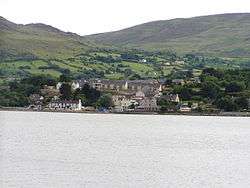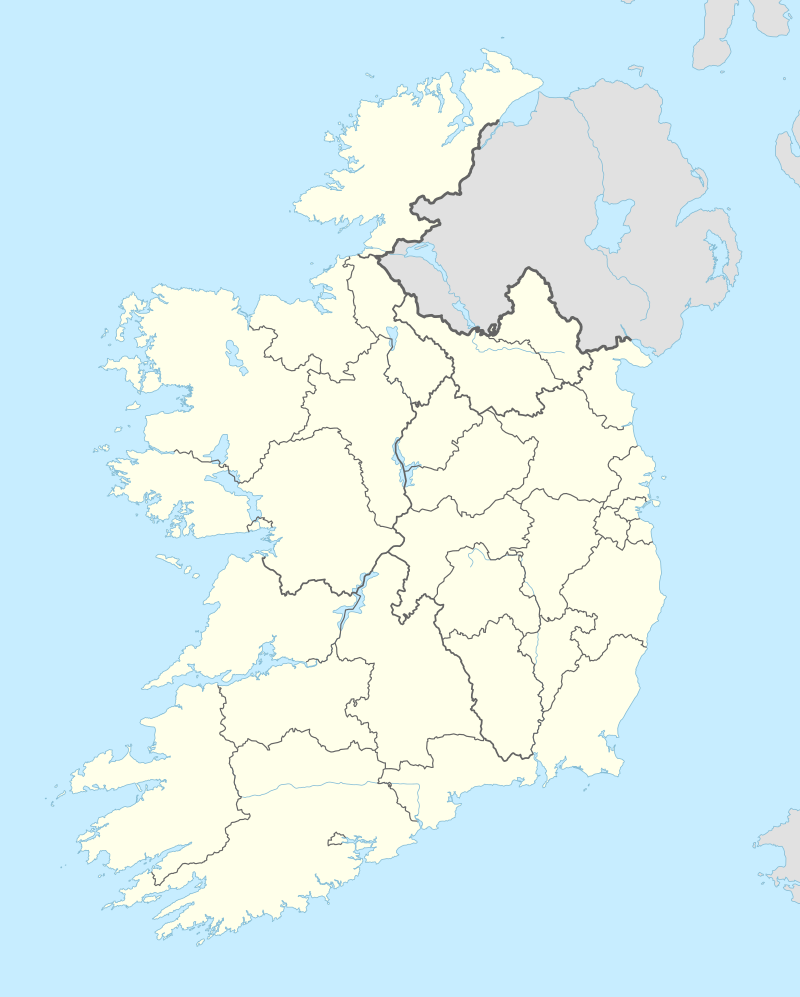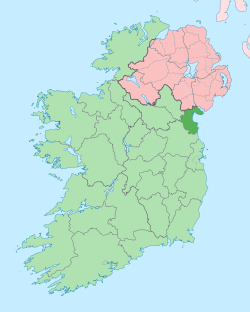Omeath
Omeath (Irish: Ó Méith or Uí Meth)[2][3] is a village on the Cooley Peninsula in County Louth, Ireland, close to the border with Northern Ireland. It is roughly midway between Dublin and Belfast, very near the County Louth and County Armagh / County Down border. As of the 2016 census, Omeath had a population of 603,[1] up from 439 during the 2006 census.[4] It is approximately 6 km (3.7 mi) from Carlingford and about 8 km (5.0 mi) from Newry. By sea, Omeath's nearest land neighbour is Warrenpoint on the south County Down coast.
Omeath Ó Méith | |
|---|---|
Town | |
 Looking across Carlingford Lough to Omeath | |
 Omeath Location in Ireland | |
| Coordinates: 54°05′24″N 6°15′30″W | |
| Country | Ireland |
| Province | Leinster |
| County | County Louth |
| Population (2016)[1] | 603 |
| Time zone | UTC+0 (WET) |
| • Summer (DST) | UTC-1 (IST (WEST)) |
| Irish Grid Reference | J137168 |
| Website | www.omeath.ie |
Omeath is home to the Cúchulainn Gaels Gaelic Athletic Association club.
Name

It is named after Muireadheach Méith (méith meaning 'the fat') and was originally called Uí Méith Mara, by the sea, to distinguish it from another Ó Méith named after the same man.[3]
History
Omeath was a village that sprung up around the old Omeath railway station in 1876. The town attracted day trippers from around Northern Ireland and elsewhere, but unlike nearby Warrenpoint, Omeath never became a major residential center. Smuggling was common, especially around the time of the Emergency (WWII).[5] One mid-19th century source reports that the town had little arable land and residents survived mostly by selling fish.[3]
Irish language
Speakers of Irish existed in Omeath until the middle of the 20th century. The last native speaker of Omeath Irish was Anne O'Hanlon, who died in 1960 aged 89.[6] Although the dialect is now extinct, recordings have been made by German linguist Wilhelm Doegen for the Royal Irish Academy.[7]
Transport
The town is located on the R173 regional road.
Omeath railway station was on the Dundalk, Newry and Greenore railway, which opened on 1 August 1876 and finally closed on 1 January 1952.[8]
A regular bus service runs through the village and links the village with Newry and Dundalk town. Bus Éireann Route 161 operates Monday to Friday,[9] and Halpenny Travel operate a service on Sundays with journeys to Dundalk and Newry.[10]
In the summer months a regular foot passenger ferry service operates between Omeath and Warrenpoint County Down. Bikes and small motor cycles can also use this service during the summer months.
References
- "Sapmap Area - Settlements - Omeath". Census 2016. Central Statistics Office. Retrieved 3 February 2019.
- "Ó Méith / Omeath". logaim.ie. Irish Placenames Commission. Retrieved 3 February 2019.
- "Ulster Journal of Archaeology". 2. 1854: 46.
Ui Meth. - Commonly known as Omeath [..] The inhabitants of this district, having but little arable land, eke out their subsistence by hawking fish throughout the country
Cite journal requires|journal=(help) - "Omeath Area Plan" (PDF). louthcoco.ie. Louth County Council. Archived from the original (PDF) on 21 June 2011.
- O'Sullivan, Harold. Dundalk and North Louth: Paintings and Stories from Cuchulainn's Country. p. 10.
- "Gaeilge Cho Lú 1961". Raidió Teilifís Éireann. Retrieved 11 October 2017.
- "Doegen Records Web Project". Digital Humanities Observatory. Archived from the original on 14 February 2010.
- "Omeath station" (PDF). Railscot - Irish Railways. Retrieved 2007-11-22.
- "Timetable (161) Dundalk − Carlingford − Omeath − Newry" (PDF). Archived from the original (PDF) on 17 December 2017.
- "Louth Linx Rural Transport Routes". Fastwindow.ie. Retrieved 2018-07-09.
